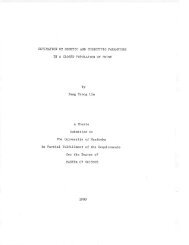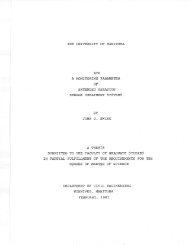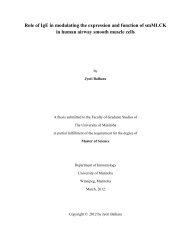- Page 1 and 2:
Influence
- Page 3 and 4:
Abstract Influence
- Page 5 and 6:
Acknowledgements This longitudinal
- Page 7 and 8:
Table of Contents
- Page 9 and 10:
Status and Non-<st
- Page 11 and 12:
Table 1.1-1 - Recent studies report
- Page 13 and 14:
Table 1.1-2 - Previous used terms f
- Page 15 and 16:
The Link Between Enamel Hypoplasia
- Page 17 and 18:
If enamel hypoplasia results from n
- Page 19 and 20:
malocclusions. 145 Additional human
- Page 21 and 22:
Daily intakes of v
- Page 23 and 24:
13. Milnes AR, Rubin CW, Karpa M, T
- Page 25 and 26:
40. Definition of
- Page 27 and 28:
71. Watt RG. From victim blaming to
- Page 29 and 30:
97. Fearne JM, Bryan EM, Elliman AM
- Page 31 and 32:
124. Burt BA, Pai S. Does low birth
- Page 33 and 34:
151. Tinanoff N, D
- Page 35 and 36:
Section 2 - Risk Factors for Enamel
- Page 37 and 38:
correspond to the timing of
- Page 39 and 40:
een published. 3,4,17,19 The intent
- Page 41 and 42:
Table 1.2-2 - Risk factors for DDE
- Page 43 and 44:
Opacity 51 Implicated Risk Developm
- Page 45 and 46:
Implicated Risk Factor Factors asso
- Page 47 and 48:
o Metabolic Abnormalities and Healt
- Page 49 and 50:
12 months of life.
- Page 51 and 52:
Other Factors Some uncommon risk fa
- Page 53 and 54:
devastating problem of</str
- Page 55:
13. An epidemiological index <stron
- Page 58 and 59:
54. Seow WK, Perham S. Enamel hypop
- Page 60 and 61:
82. Berdal A, Papagerakis P, Hotton
- Page 62 and 63:
Vitamin D may be d
- Page 64 and 65:
have been used to prof</str
- Page 66 and 67:
health’. In addition, articles we
- Page 68 and 69:
36 month trial had ended. 45 The nu
- Page 70 and 71:
Recently, a cross-sectional study <
- Page 72 and 73:
andomized, placebo-controlled study
- Page 74 and 75:
Further, amelogenin and enamelin, p
- Page 76 and 77:
A study of Austral
- Page 78 and 79:
Both dietary interventions and supp
- Page 80 and 81:
incidence of carie
- Page 82 and 83:
important nutrient. However, many <
- Page 84 and 85:
caries, and more hardening
- Page 86 and 87:
controls. 106 Interestingly, childr
- Page 88 and 89:
A few years later, additional resea
- Page 90 and 91:
Delayed Tooth Eruption Vita
- Page 92 and 93:
Description of Pop
- Page 94 and 95:
Influence
- Page 96 and 97:
D has an effect on the dentition, p
- Page 98 and 99:
14. Utiger RD. The need for more vi
- Page 100 and 101:
42. Spiller WF, Jr. A clinical eval
- Page 102 and 103:
67. Itota T, Tashiro Y, Torii Y, Ni
- Page 104 and 105:
95. Bruszt P. Kariesuntersuchungen
- Page 106 and 107:
121. Seow WK, Needleman HL, Holm IA
- Page 108 and 109:
Chapter 2 - Methods for a Prospecti
- Page 110 and 111:
Each participant also completed an
- Page 112 and 113:
Table 2.2 - Recognized case definit
- Page 114 and 115:
Population The target population fo
- Page 116 and 117:
allowed the project to suffer some
- Page 118 and 119:
women of limited m
- Page 120 and 121:
involving the surface of</s
- Page 122 and 123:
and training cup. In addition, each
- Page 124 and 125:
The questionnaire was administered
- Page 126 and 127: statistics including frequencies an
- Page 128 and 129: elationship between the two. Poisso
- Page 130 and 131: References 1. Combs GF. Vit
- Page 132 and 133: 27. Seow WK, Amaratunge A, Bennett
- Page 134 and 135: Table 3.2 - Self-declared heritage
- Page 136 and 137: Question Number Valid % Do you take
- Page 138 and 139: Maternal Awareness
- Page 140 and 141: time of recruitmen
- Page 142 and 143: Table 3.6- Prenatal</strong
- Page 144 and 145: A total of 77 care
- Page 146 and 147: indicated that they were receiving
- Page 148 and 149: and 11 hypoplasia). DDEs were also
- Page 150 and 151: Caries rates for children in this p
- Page 152 and 153: Table 3.12 - Frequency of</
- Page 154 and 155: Chapter 4 - Results: Associations <
- Page 156 and 157: II. Relationship Between 25(OH)D Le
- Page 158 and 159: Pregnancy & Health Prof</st
- Page 160 and 161: The frequency of v
- Page 162 and 163: did not (42.9 ± 21.2 nmol/L vs. 49
- Page 164 and 165: Early Childhood Caries (ECC) Pr<str
- Page 166 and 167: likely to have vitamin D levels at
- Page 168 and 169: did not statistically differ from v
- Page 170 and 171: Figure 4.4 - Predicted number <stro
- Page 172 and 173: Table 4.7 - Relationship between ds
- Page 174 and 175: frequently, and less likely to have
- Page 178 and 179: tail (p=.034) suggesting that early
- Page 180 and 181: The next series of
- Page 182 and 183: Results from the second model appea
- Page 184 and 185: Table 5.6 - Multiple regression sta
- Page 186 and 187: vitamin D. However, it did suggest
- Page 188 and 189: significant at the bivariate level
- Page 190 and 191: Table 5.12(a) - Logistic regression
- Page 192 and 193: III. Multivariate Regression Analys
- Page 194 and 195: Table 5.14 - Logistic regression fo
- Page 196 and 197: Table 5.16 - Logistic regression fo
- Page 198 and 199: Table 5.18 - Logistic regression fo
- Page 200 and 201: Table 5.19(b) - Backwards logistic
- Page 202 and 203: Table 5.20(a) - Logistic regression
- Page 204 and 205: Table 5.21 - Poisson regression for
- Page 206 and 207: If enamel hypoplasia is present and
- Page 208 and 209: Since maternal calcium levels were
- Page 210 and 211: vitamin D deficiency, and rickets)
- Page 212 and 213: to obtain it. Health literacy may b
- Page 214 and 215: vitamin D from the diet as dietary
- Page 216 and 217: home environment can be determinant
- Page 218 and 219: hormone, calcium absorption and bon
- Page 220 and 221: important nutrient. For many, this
- Page 222 and 223: this potential relationship with ac
- Page 224 and 225: genetic conditions, childhood medic
- Page 226 and 227:
vitamin D status including milk int
- Page 228 and 229:
y cariogenic oral flora. 49 Since e
- Page 230 and 231:
(49.8 ± 26.3 nmol/L vs. 45.1 ± 20
- Page 232 and 233:
pregnancy, which may have influence
- Page 234 and 235:
observed and it allowed multiple ou
- Page 236 and 237:
scientific evidence linking prenata
- Page 238 and 239:
cognizant that children who undergo
- Page 240 and 241:
preventive program would need to be
- Page 242 and 243:
makers in the formative stages. As
- Page 244 and 245:
Surprisingly, the final regression
- Page 246 and 247:
13. First Nations IaMHCCPS. <strong
- Page 248 and 249:
38. Hollis BW. Circulating 25-hydro
- Page 250 and 251:
65. Li Y, Navia JM, Bian JY. Caries
- Page 252 and 253:
91. Brownell MD, Guevremont A, Au W
- Page 254 and 255:
Chapter 7 - Conclusions This thesis
- Page 256 and 257:
This study provided an interesting
- Page 258:
esiding in disadvantaged communitie
- Page 271 and 272:
If you are taking vitamins during t
- Page 273 and 274:
Do you Eat? Never Rarely (less than
- Page 275 and 276:
What problems can early childhood c
- Page 277 and 278:
Prenatal Nutrition
- Page 279 and 280:
Did you ever add sugar to the bottl
- Page 281 and 282:
Enamel Hypoplasia Enamel Hypoplasia



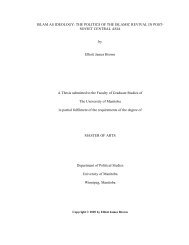
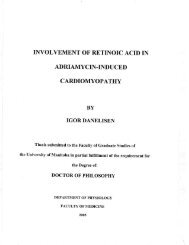
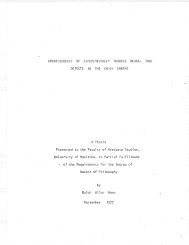
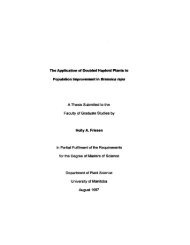
![an unusual bacterial isolate from in partial fulf]lment for the ... - MSpace](https://img.yumpu.com/21942008/1/190x245/an-unusual-bacterial-isolate-from-in-partial-fulflment-for-the-mspace.jpg?quality=85)
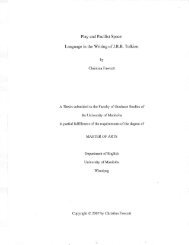
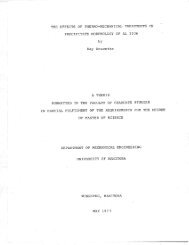
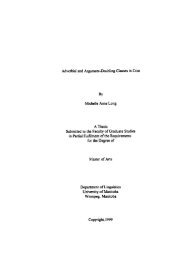
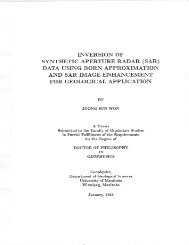
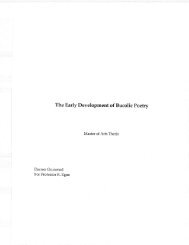
![in partial fulfil]ment of the - MSpace - University of Manitoba](https://img.yumpu.com/21941988/1/190x245/in-partial-fulfilment-of-the-mspace-university-of-manitoba.jpg?quality=85)
